Being born in the great state of Iowa I was naturally drawn to this breed. After breeding them for 5 years now I'm hooked. If they laid larger eggs they would be the best breed of chicken out there in my opinion. The check all the boxes! Broody, Good Layers, Very Docile, Dual Purpose, Feed Efficient, Pretty Patterns, Summer/Winter Hardy, Hardy Chicks.
Navigation
Install the app
How to install the app on iOS
Follow along with the video below to see how to install our site as a web app on your home screen.
Note: This feature may not be available in some browsers.
More options
You are using an out of date browser. It may not display this or other websites correctly.
You should upgrade or use an alternative browser.
You should upgrade or use an alternative browser.
-
 3ea7b5f6_7.jpeg2.7 MB · Views: 1,059
3ea7b5f6_7.jpeg2.7 MB · Views: 1,059 -
 655dc0e6_avatarpic.jpeg187 KB · Views: 1,067
655dc0e6_avatarpic.jpeg187 KB · Views: 1,067 -
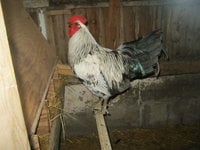 b9cc3a0c_roosterpic.jpeg1.6 MB · Views: 1,084
b9cc3a0c_roosterpic.jpeg1.6 MB · Views: 1,084 -
 fd20a687_IMG_3986.jpeg3.1 MB · Views: 1,022
fd20a687_IMG_3986.jpeg3.1 MB · Views: 1,022 -
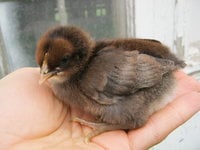 e386c8b4_IMG_2378.jpeg1.7 MB · Views: 1,069
e386c8b4_IMG_2378.jpeg1.7 MB · Views: 1,069 -
 272cb583_9.jpeg2.6 MB · Views: 992
272cb583_9.jpeg2.6 MB · Views: 992 -
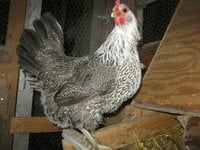 b6b36c67_1.jpeg278.2 KB · Views: 1,039
b6b36c67_1.jpeg278.2 KB · Views: 1,039 -
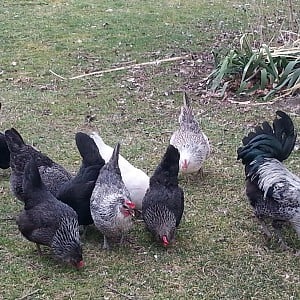 400.jpg601.8 KB · Views: 474
400.jpg601.8 KB · Views: 474 -
 400.jpg224.2 KB · Views: 1,091
400.jpg224.2 KB · Views: 1,091 -
 LL.jpg193.2 KB · Views: 501
LL.jpg193.2 KB · Views: 501 -
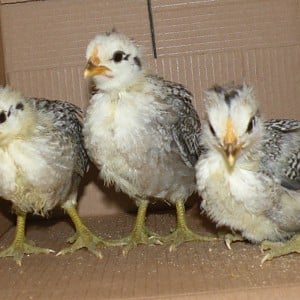 juv.jpg165.8 KB · Views: 509
juv.jpg165.8 KB · Views: 509
- Gray Farms
- 5.00 star(s)
Pros: Good layer, broody, docile, dual purpose
Cons: egg size
- ChickenGoesRuff
- 5.00 star(s)
Pros: Great Layers, Friendly, Good Foragers, Protective, Smart
Cons: None
Love my Iowa Blues! My first flock was a female and five roosters. They ran the whole yard and never left the property. The rooster I kept after downsizing acts like a large puppy, following people for treats, cuddling to get his wattles scratched, and even doing tricks. He is very protective of the young birds, and always brings treats over to the ladies. He even befriended the cats and dog, taking naps under the trees together. Also, I have not had any problems with egg fertility yet, and am on the third and fourth hatches that have been sired by him. Great breed overall and I can't wait for my new ones to arrive!
- Purchase Date
- 2015-04-23
- Squamate Farmer
- 5.00 star(s)
Pros: Everything
Cons: Hard to come by
I really love these guys, they've got this fantastic feral character, but are mild enough to chill when I need to pick them up for something. They ooze confidence, even as very young chicks, but they're not abusive brats in the least. If you like animal behavior in general and are a fan of various chicken breeds, get some of these guys, they're something else.
- chickygirlrocks
- 5.00 star(s)
Pros: great
Cons: none
Beat rooster ever
- DavidILoveYou22
- 5.00 star(s)
Pros: Beautiful (especially the eyes) Eats next to nothing
Cons: Flighty
Brandon Moore (named after my favorite teacher at my old school) the Iowa Blue hen is my second favorite hen in my flock. She is very flighty but calms down when she is caught. She has the most beautiful eyes, and is a real character. She has not started laying yet so I can't comment on her laying abilities, but I think she will be very good, economically speaking, as a layer, because she eats almost nothing. I literally have never seen her eat, and neither has my best friend (her previous owner, to whom I traded an amazing EE hen for her because I fell in love). Amazing birds.
- BlackBrookPoultry
- 4.00 star(s)
Pros: Protective of hens, good forager
I have only one Iowa Blue rooster and he is the best roo I have ever had. He is at least 8 lbs and absolutely gorgeous. I got him from Sandhill Preservation Center as a packing peanut. He will take on any predator to protect his hens, he always calls his ladies in when there are treats and watches over them while they eat. He is the dominant roo in my flock, but he is not overly abusive to the other roosters. He usually puts them in their place only when they are trying to mount his hens. He has never offered to attack any person. I have nothing negative to say about him. At 3 years old he is part of a free range flock and has done a wonderful job taking care of his hens. Today a pair of hawks flew through the yard, he sent out the call for all the girls to hide, while he stood in the middle of the yard, chest out, seemingly waiting for them to challenge him.
- Purchase Date
- 2010-08-17
- StelleKitten
- 4.00 star(s)
Pros: Alert, protective, vigorous
Cons: vigorous
I love my Iowa Blue roo. He's a sight to behold when he is strutting around the chicken yard. He is very alert and is the first to tell off on aerial predators. He doesn't really tell off on anything else but that could be because we have so many cats that he doesn't see them as threats. He does protect his hen (we don't have enough grown hens yet but working on that) very well and makes sure that she gets all the tasty bits of food that we toss out to them. He is very vigorous in his mating. She hasn't had an infertile egg yet that we have seen. But that also means her feathers are kind of worn down and it does get rather annoying to see him at it just about all the time.
As far as personality goes, he is a bit flighty but not too bad. Once you actually catch him, he is a cuddler. He makes some really random noises sometimes and I swear he tries to purr just like the cats.
ETA



As far as personality goes, he is a bit flighty but not too bad. Once you actually catch him, he is a cuddler. He makes some really random noises sometimes and I swear he tries to purr just like the cats.
ETA
- Purchase Price
- 2.00
- Purchase Date
- 2012-08-21
- ReikiStar
- 4.00 star(s)
Pros: Great foragers, feisty, active, beautiful and consistent layers
Cons: A bit aggressive towards other breeds
Unlike the other reviewers, we only have 3 hens. No roosters and no plans to breed. Ours come from Privett Hatchery, 2012 brood. They are smaller in the body and their eggs, likewise are smaller than we had anticipated, but they are only 8 months old right now. Love these birds though! They don't seem to be any more flighty than any other bird. In fact they are quite the explorers. Very adventurous (there isn't anything they won't climb onto and investigate) and usually the last ones back into the coop from free-ranging. The 3 IB's hang together and were raised with 2 Polish, 3 Exchequer leghorns and 1 Chantecler. The IB's rule the roost and I've seen one IB who, honestly looks like she's part Sumatra, take on the Polish rooster. He's since won that battle as I saw him mate with her the other day. But these girls are bad a$$es. They can certainly take care of themselves. Their black feathers with the birchen neck and bright red combs are really beautiful.
They haven't gone broody but so far they are consistent and ardent egg layers. I like, for a brown egg layer, that none of them seem to have the issue of blood or tissue appearing in the egg. We've seen it with the heavier European brown egg laying breeds.
I wouldn't call this a "touchy feely" or affectionate breed, but they know who holds the treat can and respond readily to being called from across the yard. Bright, alert, and confident, we're really glad we gave this breed a try.
They haven't gone broody but so far they are consistent and ardent egg layers. I like, for a brown egg layer, that none of them seem to have the issue of blood or tissue appearing in the egg. We've seen it with the heavier European brown egg laying breeds.
I wouldn't call this a "touchy feely" or affectionate breed, but they know who holds the treat can and respond readily to being called from across the yard. Bright, alert, and confident, we're really glad we gave this breed a try.
- Purchase Date
- 2012-04-14
- karimw
- 3.00 star(s)
Pros: These birds are very hardy and terrific free range birds.
Cons: They are on the small side for table bird and could be better layers.
I embarked on a project to help return these birds to their historical popularity with some chicks from Ideal and Privett hatcheries in fall 2009. Since then I have worked with a group of others to increase popularity
and improve these birds and hopefully establish a standard for them. I am now beginning to plan my 5th generation and happily, I like the results!
We need these birds to be meatier and better layers without losing their inherent foraging and survival abilities. I have witnessed 2 occasions where IaB hens have successfully fought off hawks and they are clever, relentless broodies.
The color on these birds is quite varied and we are working on getting their type standardized.
and improve these birds and hopefully establish a standard for them. I am now beginning to plan my 5th generation and happily, I like the results!
We need these birds to be meatier and better layers without losing their inherent foraging and survival abilities. I have witnessed 2 occasions where IaB hens have successfully fought off hawks and they are clever, relentless broodies.
The color on these birds is quite varied and we are working on getting their type standardized.
- Purchase Date
- 2010-10-25
- Hurley
- 5.00 star(s)
Pros: Hardy (cold and heat), Foragers, Sweet, Not aggressive to humans, Cocks protective against predators
Cons: Smaller body size at present, frequent broody, cocks mature early and can spar, can be flighty
I love these little birds. The roosters are easy to get along with and take very good care of their ladies (though early on, a little too much care - the boys are quite hormonal early on and mature very early). They lay nice sized medium to large light brown eggs and are easy keepers. My little flock roams our acreage and we have every predator known to man, other breeds disappear, my Iowa Blues take good care of themselves.
They can be a little flighty, but easily calm down with handling and I've never had one be aggressive to humans. The males will spar and may need to be separated as they mature very early. Currently, the breed is under recovery with a small group of people working towards bringing them back. At this time they are smaller than I would like to see and could use selection towards their original purpose as a dual purpose breed.
Plucky and charasmatic, the Iowa Blue has a delightful personality, very expressive faces, tails held at a jaunty 80 degrees. Definitely a breed to enjoy and I could watch their antics for hours.
They can be a little flighty, but easily calm down with handling and I've never had one be aggressive to humans. The males will spar and may need to be separated as they mature very early. Currently, the breed is under recovery with a small group of people working towards bringing them back. At this time they are smaller than I would like to see and could use selection towards their original purpose as a dual purpose breed.
Plucky and charasmatic, the Iowa Blue has a delightful personality, very expressive faces, tails held at a jaunty 80 degrees. Definitely a breed to enjoy and I could watch their antics for hours.
- jaj121159
- 4.00 star(s)
Pros: Calm, cold hardy, handled hot summer, frequent broody
Cons: Frequent broody, average layer of medium to large light tan eggs, can be flighty.
I love my Iowa Blues. The roosters are friendly, but cautious around humans. They get six or so pounds and have white hackles and saddles on a mostly black body. The hens are smaller three to four pounds. Mine have gone broody several times, but have not pulled off a successful hatch. They aren't great layers, but fair layers of light tan medium to large eggs. My Iowa Blue hens seem to be the boss hens in a mixed coop. They are good flyers, so if in a run it should be covered.
I got them because my wife is from Iowa and they are a very rare breed. They aren't blue at all, but their black colorization can look blue at times.
I got them because my wife is from Iowa and they are a very rare breed. They aren't blue at all, but their black colorization can look blue at times.
